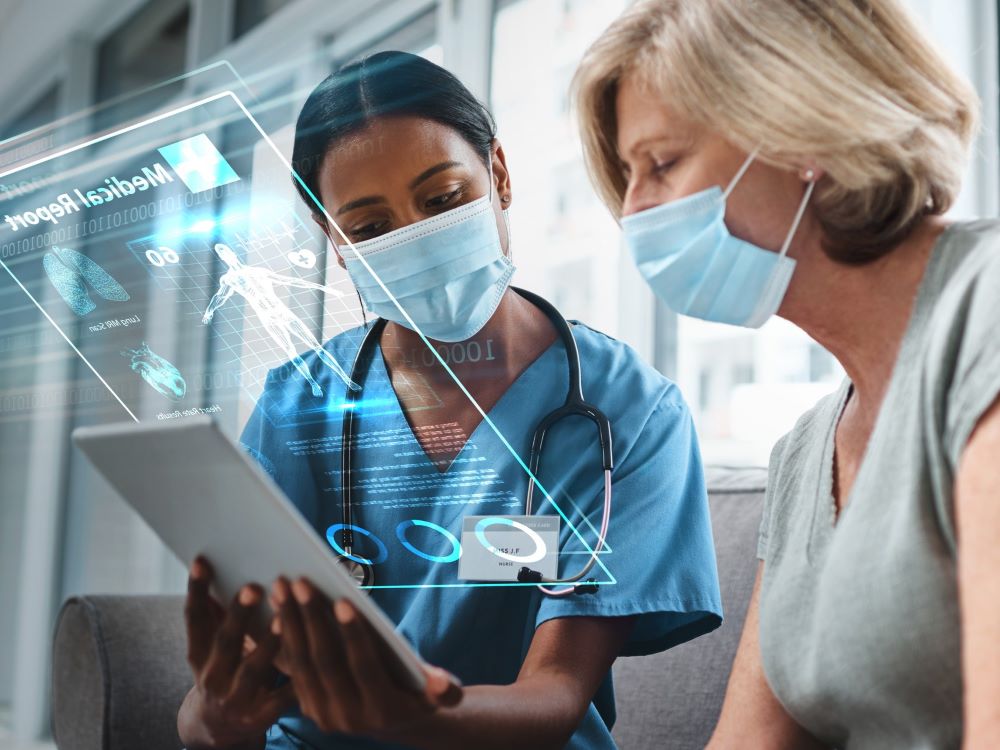Georgia CTSA and Washington University ICTS TL1 Trainees Successfully Debate AI in Healthcare

During the debate, Georgia CTSA TL1s successfully argued the pros of AI in healthcare while WashU ICTS presented cons. “It is imperative that AI is regulated and implemented after thorough and comprehensive testing and analysis. AI has the potential to positively benefit and improve the healthcare system, not only for healthcare professionals but the patients that they take care of leading to better outcomes for all,” says Denise Fahey, UGA.
On May 21, 2024, the TL1 Visiting Science Working Group Debate was held virtually. The event was hosted by the Georgia CTSA and Washington University (WashU) School of Medicine and co-sponsored by the national CTSA Coordination, Communication, and Operations Support (CCOS). Four Georgia CTSA TL1 trainees participated including two predocs: Kamaria Dansby, Emory, and Denise Fahey, UGA, and two postdocs: Sarah Scott, MD, Emory, and Kailey Oppat, MD, Emory.
TL1 trainees engaged with each other in an informed discussion to address a major disruptive force in medicine, artificial intelligence. The debate, ‘Smart Medicine or Algorithmic Dilemmas: The Pros and Cons of AI in Healthcare’, was an engaging and informative debate, allowing participants to explore the potential advantages and ethical complexity surrounding AI and healthcare, resulting in an enlightening and meaningful conversation on this important topic.
Setting the stage for the debate, moderator Thomas Kannampallil, PhD, Associate Professor, Anesthesiology & Computer Science, WashU, asked, “The implications of AI in medicine have been well documented, but the mechanisms by which these can be appropriated and translated into pragmatic practice is less clear. Much of what we've heard to date is the progress that's been made in the technological aspects on what the tools can do. But the translational part of what AI can do and the true impact of some of the tools and technologies like large language models and generative AI is yet to be brought to the point of care. The question to answer at this point is AI hype? Or is there pragmatic value as we go ahead?” The teams considered this as they presented the pros and cons of the hype versus the value of AI within this context.
Georgia CTSA TL1s opened the debate by presenting the pro arguments supporting the use of AI in healthcare. Dr. Scott started the discussion, “We're not talking about robots replacing clinicians and healthcare settings. We want to talk about how appropriately controlled and regulated AI tools can improve healthcare from all angles. We will touch on three of many areas in which AI can improve how our current systems operate, including improving clinician efficiency by reducing burdensome administrative tasks, improving diagnostic accuracy and consistency and patient diagnoses, and improving research of this efficiency in the era of big data all while reducing costs.
Kamaria Dansby followed and highlighted the benefits of AI in healthcare in terms of diagnostics and treatments: early detection of diseases, improved accuracy of disease diagnosis, and personalized medicine treatments. Dansby stressed the importance for institutions to be, “intentional and thoughtful about the use of AI in healthcare with the overall goal of shaping the AI revolution to better human health, generate economic value, and also promote social justice.”
Next, Dr. Oppat presented the benefits of AI in healthcare for research including the ability to analyze ‘big data’ and comprehensive data analysis for rare diseases.
WashU countered with the pitfalls of AI in medicine beginning with privacy concerns with AI within healthcare regarding linkability, informed consent, and accountability and transparency. The moderator, Dr. Kannampallil, summarized the cons presented including the challenges of these models and considerations that should be taken into account to prevent the perpetuation of biases within these models with respect to race and other inequities within these systems.
Dr. Kannampallil congratulated both teams, “It was an excellent presentation from both sides, bringing to bear some of the more important considerations that we have to account for as we go forward the sort of very murky field that's evolving and everybody's jumping on the bandwagon.”
Following the debate, Georgia CTSA’s TL1s reflected on their experience.
“I have enjoyed being a Georgia CTSA TL1 scholar because it has exposed me not only to new areas of research and people but also to opportunities such as the TL1 debate. By participating in the TL1 debate, I learned about AI in healthcare, participated in my first debate, and interacted with other TL1 scholars that I hadn’t previously worked with. Overall, it was a great experience, and I am glad I did it!” said Denise Fahey.
Kamaria Dansby remarked, “Participating in this year’s TL1 debate on the role of AI in healthcare was incredibly informative. I enjoyed learning about its current applications and hearing the diverse perspectives and arguments from the other team.”
“I’m incredibly grateful for the opportunity to have been a Georgia CTSA TL1 postdoctoral trainee this year. From classes to scientific conferences, I’ve learned an incredible amount and taken advantage of opportunities I wouldn’t have had otherwise, like the TL1 debate with WashU. The debate format challenged us to communicate in a different manner than we are accustomed to in scientific presentations within the confines of a friendly environment. It was fun to participate across CTSAs alongside our WashU colleagues, who we had the opportunity to socialize with at the national TS2024 conference,” added Sarah Scott, MD.
View the debate recording via the link below and enter the passcode: 12cR%kh9
The Georgia CTSA TL1 Program provides outstanding opportunities for clinical and translational science training for predoctoral and postdoctoral trainees at the Georgia CTSA partner institutions: Emory, Georgia Tech, Morehouse School of Medicine, and UGA. The program is focused on providing didactic and mentored research training for predoctoral (medical students, PhD students, PharmD students) and postdoctoral (resident and fellow physicians, PhD postdocs, PharmD residents) trainees interested in a career focused on clinical and/or translational research relevant to human health.